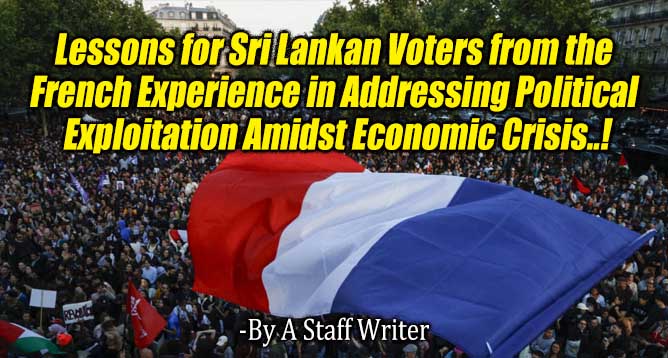-By A Staff Writer

(Lanka-e-News -09.July.2024, 11.30 PM) In April 2022, Sri Lanka faced an unprecedented economic crisis, culminating in the country's first sovereign default since its independence in 1948. The crisis exposed deep-rooted structural issues, rampant corruption, and political mismanagement, leading to widespread public discontent and a severe loss of trust in the political leadership. This report explores the current political and economic landscape in Sri Lanka and draws parallels with the French electorate's approach to managing political exploitation. By examining how French voters navigate complex political environments, this report aims to provide actionable insights for Sri Lankan voters to prevent politicians from taking advantage of the nation's bankruptcy.
Sovereign Default and IMF Assistance
In April 2022, Sri Lanka announced its inability to meet its debt obligations, marking a historic default. The crisis necessitated seeking assistance from the International Monetary Fund (IMF) to manage mounting international and domestic debt. This intervention highlighted the severe fiscal mismanagement and the urgent need for structural reforms.
The economic downturn forced thousands of Sri Lankans to leave the country in search of better opportunities. Domestically, the crisis led to widespread unemployment, poverty, and social unrest. Many citizens struggled to meet basic needs, with significant disruptions in essential services like electricity, healthcare, and education.
The Sri Lankan Supreme Court held the Rajapaksha family responsible for the economic mismanagement that led to the crisis. This ruling underscored the pervasive corruption and nepotism that plagued the country's governance. Despite these findings, political maneuvers continued to dominate the landscape, further eroding public trust.
Efforts to Navigate Economic Failure
President Ranil Wickremesinghe assumed office with a mandate to steer the country out of economic turmoil. However, his tenure has been marred by allegations of corruption, including accusations of masterminding the "Bond Scam" during the Yahapalana period. His reliance on the IMF's rescue plan has been perceived as a strategy for political survival rather than genuine reform.
Ranil's efforts to delay the presidential election by seeking Supreme Court intervention, coupled with attempts to bolster his voter base by encouraging crossovers from the Samagi Jana Balawegaya (SJB) to the United National Party (UNP), indicate a calculated political maneuvering. Despite his efforts, his popularity remains low, and there are signs that the Sri Lanka Podujana Peramuna (SLPP) may field its own candidate, further fragmenting the political landscape.
Ranil's attempts to gain the support of Tamil and Muslim parties have been met with skepticism, particularly given his refusal to address the controversial forced cremation issue. The Tamil diaspora's plan to propose their own candidate reflects the deep-seated mistrust and dissatisfaction with the current leadership.
SJB's Struggles and NPP's Rise
The SJB, led by Sajith Premadasa, faces criticism for its lack of a compelling alternative plan, partly due to its historical ties with the UNP. This vacuum has allowed the National People's Power (NPP) to gain traction by offering a more credible and coherent policy platform, resonating with an electorate desperate for change.
The French Approach to Political Exploitation
French voters are known for their pragmatic approach to elections, often prioritizing long-term stability over short-term gains. This mindset has enabled them to resist populist and extremist rhetoric, focusing instead on candidates with credible plans for sustainable development.
French voters have demonstrated a capacity to unite against corruption and authoritarianism, exemplified by their rejection of far-right parties in recent elections. This unity has been pivotal in safeguarding democratic values and ensuring accountable governance.
Prioritizing Long-Term Solutions
Sri Lankan voters must prioritize long-term solutions over immediate, populist promises. This requires a critical evaluation of each candidate's track record and policy proposals, focusing on those that offer sustainable economic and social development.
Voters should reject candidates with a history of corruption and incompetence. Holding political leaders accountable for their past actions is crucial in establishing a culture of transparency and integrity in governance.
Sri Lankans need to unite around a common agenda that transcends ethnic, religious, and partisan lines. This unity is essential to address the country's systemic issues and build a resilient, inclusive society.
By adopting the French electorate's approach to informed and pragmatic voting, Sri Lankan voters can effectively counter political exploitation. This involves a collective commitment to democratic principles, accountability, and long-term national interest.
The lessons from the French electorate offer valuable insights for Sri Lankan voters navigating the current political and economic crisis. By prioritizing long-term solutions, rejecting corrupt leadership, and uniting around a common agenda, Sri Lankans can reclaim their democracy and rebuild their nation. The upcoming elections present a critical opportunity to break from the past and chart a new course towards sustainable development and inclusive governance.
---------------------------
by (2024-07-09 22:05:07)
Leave a Reply